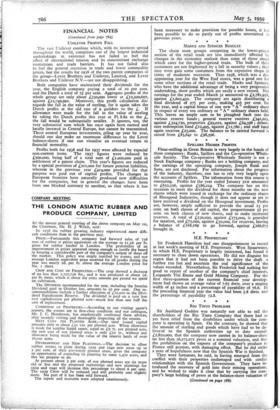The vast Unilever combine which, with its interests spread throughout
the world, comprises one of the largest industrial undertakings in existence has not failed to feel the effect of international tension and its concomitant exchange restrictions and trade barriers. It has not failed also to feel the general recession in trade and lower commodity prices, but the results for 1938 of the two parent companies of the group—Lever Brothers and Unilever, Limited, and Lever Brothers and Unilever N.V.—are not disappointing.
Both companies have maintained their dividends for the year, the English company paying a total of to per cent. and the Dutch a total of 7i per cent. Aggregate profits of the whole group are only about £530,000 lower at £12,220,607, against £12,749,991. Moreover, this profit calculation dis- regards the fall in the value of sterling, for it again takes the Dutch profits at the old rate of 9 guilders to the L. If allowance were made for the fall in the value of sterling by taking the Dutch profits this year at Fl. 8.8o to the £, the fall would be substantially smaller. It ignores, too, the very substantial sum which has once again been earned and locally invested in Central Europe, but cannot be transmitted. These central European investments, piling up year by year, should one day make an enormous difference to the Lever balance-sheets if one can visualise an eventual return to financial normality.
Profits both for 1938 and for 1937 were affected by especial non-current items. The 1937 figures were reduced by £5oo,000, being half of a total sum of £i,000,000 paid in settlement of a patent claim. This year's figures are reduced by a special provision of £211,00o for future pension liabilities, whereas in the previous year £414,000 provided for that purpose was paid out of capital profits. The changes in European frontiers have naturally produced new difficulties for the companies, but in general the changes have been from one blocked currency to another, so that where it has
been necessary to make provision for possible losses, it h 5 been possible to do so partly out of profits =remitted in previous years.














































 Previous page
Previous page